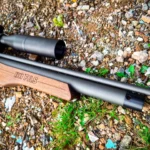
The new tungsten shotgun ammo from Hevi-Shot is a superior, hard-hitting, bird-killing non-toxic load. (Photo By: Jeff Johnston)
If you’re the type of waterfowler who feeds your family by hunting 60 days per year, you probably already know by now that HEVI-Shot tungsten may not be the stuff for you because it’s not cheap. You can get 5 orders of Peking duck down at the local Chinese buffet for less. It’s expensive because there are very few tungsten mines in the world, and this ultra-dense metal is a commodity coveted for making everything from competitive darts to turbine blades and rocket nozzles. But the fact is it’s simply superior to steel, and even a fair margin better than lead bird shot. How?
Imagine a tennis ball and a baseball both thrown 90mph by Pedro Martinez. Which one would you rather get beaned with? The tennis ball, of course, because it’s much less dense and results in much less energy when it hits you. I.e. it won’t hurt as much. The same laws of physics apply to shotgun pellets.
Table of Contents
Heavy Set
HEVI-Shot’s XII load uses tungsten pellets that measure 12 g/cc (grams per cubic centimeter). Compare that to steel at 7.8 g/cc, then imagine a No. 4 HEVI-Shot pellet and a steel pellet each going 1400 fps. The HEVI-Shot load is like a swarm of our aforementioned baseballs speeding toward that duck, whereas the steel is like the tennis balls. But most of us know this already.
The big advantage of tungsten, however, is that because it’s denser than steel (it’s also denser than lead, Bismuth, and most other materials) the shooter can choose a shot size two to three sizes smaller than comparable steel load and still maintain the same downrange energies. So by choosing a HEVI-Shot No. 4 pellets for geese over No. 1 steel load, for example, shooters are afforded many more pellets per load for denser patterns and more wound channels on the bird. Fact is, denser pellets penetrate deeper and kill quicker.

Tungsten Tested
When I tested HEVI-Shot’s new HEVI-XII shell (3”, 1 1/4-oz. No. 4s) here’s what I found: The load contained an average of 166 pellets that together averaged 583 grains, or 1.33 ounces per payload. (That’s more than advertised.) This payload is touted to travel at 1,450 fps, which equals 2,549 ft.-lbs. energy at the muzzle. Although my actual results were very similar, the inputs differed slightly. From my 28-inch barrel I recorded a mean velocity of 1401, that, when multiplied by a payload mass average of 1.33 ozs, equals 2,541 ft.-lbs. But it’s when the individual pellet energies are compared that the heavier tungsten pellets shine like diamonds in a sea of decoy weights: Consider that the average No. 4 HEVI-XII pellet weighs 3.6 grains; when going 1400 fps it results in 16 ft.-lbs. per pellet! Compare that to a 2.4-grain steel pellet going 1,400 fps for 10 ft.-lbs energy and you can understand where your money’s going.
However, this is where HEVI-Shot also gets a little shaky: I had to use a pellet weight average because, due to the process HEVI-Shot uses to make its tungsten shot, the pellets aren’t uniform. A payload of No. 4 shot contains pellets that individually weigh anywhere from 3.4 grains to 6.6. This leads to my second criticism of HEVI-Shot: It is not known for perfectly uniform patterns, which I suspect is a by-product of the varietal shape and weights of the pellets.
Results from my patterning board bore this out. I achieved best results from a modified choke tube. I must add this observation though: Regardless of how non-uniform the patterns look to my eye, ducks don’t seem to mind. All the HEVI-Shot I’ve used in the past have performed admirably on live game.
As for recoil, it’s academic. A 1¼ ounce payload of steel going 1400 compared to a 1¼-ounce payload of tungsten hurts equally bad by producing around 40 ft.-lbs. free recoil energy from a 7.5-lb. shotgun.
Packed to Perform
HEVI-Shot utilizes a healthy load of flaxseed to serve as buffer from the ultra-hard shot that can ding barrels and choke tubes if the choke is too tight or the load is not properly buffered. While I can’t be sure of flaxseed’s performance as a buffer compared to plastics and silicones used in other loads, frankly I’d rather be shooting natural flax seed in my lakes and fields over plastic. Speaking of plastic, HEVI-XII employs a rather simple, 4-petal, 50-grain plastic wad. The load is available in 12-gauge, 20-gauge and, interestingly, 28-gauge in size 2 (12-gauge only) 4 and 6.
HEVI-Shot’s new XII product differs from past HEVI-Shot tungsten shells mainly in that it is packaged in boxes of 25. At around $50 for a box, certainly they cost more than the 10-round boxes, but packaged as such they cost less per shell. Look, I’ve killed my share of ducks, but I also know that regardless of what shell I’m using, sometimes birds refuse to die. More times than I care to admit I’ll empty my gun at a bird only to wing it before it skims down 60 yards out, where I’ll have to shoot it 5 more times on the water. Perhaps you’re better than me, but boxes of 10 just don’t cut it.
In sum, HEVI-Shot’s new HEVI-XII load is far superior to nearly all duck loads that utilize less dense material. If you choose it, you’ll get the added advantage of choosing smaller shot sizes for denser patterns whose individual pellets hit hard. Trust me, you’ll be able to see that difference in the field. You’ll also feel it in your wallet, but that’s just it. New HEVI-XII is expensive to be sure, but in 25-round boxes it’s not as bad as it used to be. What waterfowler can’t appreciate that?








































